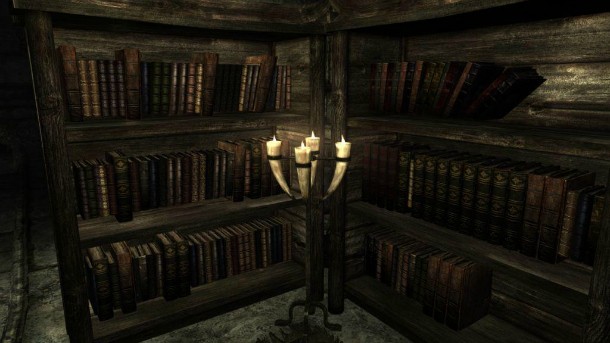The magazine is back. Get your subscription now!
Stopping To Smell The Roses

This console generation is filled with stunning open worlds. Entire games have been based around settings like Skyrim and Rapture, where the environments are characters in themselves. Particle effects and dynamic lighting make them all the more believable while the narratives draw you into the fold. Story missions both big and small showcase quality writing, guiding you through your quests and providing a solid purpose to strive toward. All of this meshes together to engage you every step of the way. For me though, the most important writing in open worlds isn’t the main quests and scripted events, but the trivial pieces you might not even notice.
A well-written storyline and focused side missions do their part to keep me engaged while I’m exploring a vast game world; I need more to be really immersed though. Optional conversations have always lured me off the beaten path, while scattered notes give me a deeper understanding of the setting’s lore. Bookshelves stacked to the brim with history books and children’s fantasy tales encourage me to investigate every page in an effort to better understand the story’s intricacies.
In a way, modern games have spoiled us. Everything happens in the blink of an eye: respawns rarely take more than a few seconds, long load-screens infuriate us, and extended cutscenes are little more than a distraction before gameplay. With so many triple-A titles releasing every month, it’s hard to find time when we can just enjoy every single moment.
I’m no stranger to this impatience. My obsession with trying every game has always clashed with my obsession to complete every one. It’s not to say that I don’t thoroughly enjoy playing most of the games I pick up, but there have been times when I wish I could just stop and take it all in.
To use the aforementioned Skyrim, I was completely overwhelmed when I first stepped into the massive homeland of the Nords. All I wanted to do was explore every nook and cranny to better understand the world. No cave was too deep to delve into, and no city was out of my reach. If I did come across a book, I immediately put it down upon finding that it didn’t offer me any skill bonuses. Incidental conversations between two bandits always took a backseat to the experience I could receive by killing them.
When I gave things more than a cursory glance though, and actually took the time to read the books without skill attributes attached to them, and listened to those ancillary conversations, I really started to feel like part of the setting. Even if I didn’t retain every fact about Tamriel’s history or Argonian trade routes, the notes and memoirs transported me to the fantasy world faster than any guild mission ever could.
Video game lore isn’t for everyone. There are still times when I would rather focus on level progression and quests than learn about the origins of the Dark Brotherhood. But when a game is holding my attention every minute I play it, I love nothing better than to delve into those little bits of information that I come across. Something about reading the journal I find at a campsite only to learn that the author was a legendary hunter makes me feel like part of the game. Overhearing a conversation between two guards regarding one of their newborn babies expanded the already vast world for me. To me, these trivial bits of information were infinitely more rewarding than some of the main story threads even were.
Games like Lost Odyssey and even the more recent Dishonored also stand out. The heart-wrenching stories presented in the former flesh out the story of the tortured immortal you play as. They’re simultaneously inspiring and depressing, and even overshadow the game’s lauded combat system. Dishonored, on the other hand, ties gameplay and narrative together with its books and audio clips. The moment that stands out to me most is when I found the combination to a safe in someone’s journal. This might not sound extraordinary, but the code wasn’t given to me outright. Using a memorable date in the writer’s entry, I was able to discern the combination to acquire the contents in the safe. Not only does Dishonored encourage you to delve into its optional side content, but it also rewards you for it.
I’m not saying that every game needs this kind of involvement. I have just as much fun with a well-tuned platformer or impulsive shooter, and yes, there are amazing games with no story whatsoever. I’m just hoping that developers don’t lose sight of the little things in their big worlds, because these are arguably the most immersive part.









